Daniel Garber talks with Kore-eda Hirokazu about Monster at #TIFF23

Edited version (8m 27s)
Unedited version (17m 51s) 日本語付き
Hi, this is Daniel Garber at the Movies for culturalmining.com and CIUT 89.5 FM.
Photograph by Jeff Harris
Minato is a school kid in a small town whose mother works in a dry cleaner. But when he comes home one day bleeding, in pain and deeply troubled wants to know who hurt him. When she finds his teacher, Mr Hori is to blame, she tries to get him punished but faces indifference or polite, meaningless words from the teachers and principal. But as the story unfolds, we discover his teacher may not be the monster she suspected.

Monster is also an intriguing new feature film by Kore-eda Hirokazu that looks at children, makeshift families, and positions of power, and examines who suffers from bullying and violent crimes, who is blamed for them, and who actually does them and gets away with it. He also ponders bigger concepts like disasters, reincarnation and life after death.
It features an intricate story, great acting, and a lovely soundtrack by the late Sakamoto Ryuichi. Kore-eda is an award-winning director, writer and producer, whom I’ve previously talks with about Like Father, Like Son, Our Little Sister, After the Storm, and The Third Murder.
I spoke with Kore-eda in person, on-site at #TIFF23.
Monster opens in Toronto on December 1, 2023 at the TIFF Bell Lightbox.
Genre movies. Films reviewed: Relax I’m from the Future, Strange Way of Life, Humanist Vampire Seeking Consenting Suicidal Person
 Hi, this is Daniel Garber at the Movies for culturalmining.com and CIUT 89.5 FM.
Hi, this is Daniel Garber at the Movies for culturalmining.com and CIUT 89.5 FM.
Fall Film Festival Season in Toronto continues in October with Toronto After Dark, showing New Horror, Sci-Fi and Action movies from Oct 18-22 at the Scotiabank Theatre in front of huuuuge audiences, the perfect things to watch as Hallowe’en gradually approaches.
This week, I’m looking at strange new takes on traditional genre movies — a science fiction comedy, a western, and a vampire movie — two of which played at TIFF this year. There’s a reluctant vampire in Quebec, two old friends in the old west, and a misbegotten traveller… from far in the future.
 Relax, I’m From the Future
Relax, I’m From the Future
Wri/Dir: Luke Higginson
Casper (Rhys Darby) is a guy from the future dressed in a purple lycra onesie. He jumped through a wormhole into the present but isn’t exactly sure what to do now. He doesn’t need anything fancy, he just wants to experience this era, one he considers great musically, artistically and all around cool. The one catch? He can’t go back to the future — he’s stuck here. Luckily he meets a compatible friend named Holly (Gabrielle Graham), a self described black, queer vagina-muncher. She agrees that right now is the best of all possible worlds for her. Though she thinks Casper is a homeless nut bar, she humours him and his strange stories. But everything changes when he proves to her he knows things he couldn’t know unless he travelled in time. Like what’s the next winning lottery ticket or predicting a strange phenomenon falling from the sky. So they agree to team up, to make some money and then save the world. What he doesn’t realize is there’s an assassin sent back in time by the government to disintegrate people just like him. Doris (Janine Theriault) is a ruthless killer who enjoys zapping miscreants like Casper. Then there’s Percy (Julian Richings), a suicidal waiter at a diner who is always doodling weird punk cartoon sketches. In the future, long after his death, Percy will become a famous folk hero, and Casper really wants to meet him before he dies. But will his actions upset the cosmic balance?
Relax, I’m from the Future is a funny low-budget science fiction comedy about ordinary people bungling there way through time. I admit it, I’ll watch any time-travel movie, no matter how bad. Luckily, this one’s pretty good, both quirky and funny, with some clever, new time-travel twists, and minimal special effects. The costumes are great and the director make good use of split screen technology. It’s shot around Toronto and Hamilton, featuring local hardcore punk band PUP, with a mainly Toronto cast including horror stalwart Richings as Percy and featuring kiwi comedy star Rhys Darby from Flight of the Concords in the title role. If you want something light and silly, check out Relax, I’m from the Future.
about ordinary people bungling there way through time. I admit it, I’ll watch any time-travel movie, no matter how bad. Luckily, this one’s pretty good, both quirky and funny, with some clever, new time-travel twists, and minimal special effects. The costumes are great and the director make good use of split screen technology. It’s shot around Toronto and Hamilton, featuring local hardcore punk band PUP, with a mainly Toronto cast including horror stalwart Richings as Percy and featuring kiwi comedy star Rhys Darby from Flight of the Concords in the title role. If you want something light and silly, check out Relax, I’m from the Future.
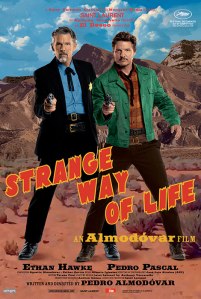 Strange Way of Life
Strange Way of Life
Wri/Dir: Pedro Almodóvar
Silva (Pedro Pascal) is a rancher in the Old West. He lives in a homestead in the mountains with his incorrigible, adult son. Jake (Ethan Hawke) is the sheriff of a small town who lives in a simple room. The two once were close but haven’t seen each other for 25 years. Until Silva walks through the police station door one day. Why is he there? Perhaps it has to do with a recent killing, whose shooter is still unknown (though Jake has his suspicions.) Or maybe it’s something totally unrelated to that. Soon enough, they’re up in Jake’s apartment for some hanky-panky as if they never left their wild young days. They were lovers once across the border in Mexico a quarter of a century earlier. Can that relationship be rekindled? Or will the recent murder make that impossible?
Strange Way of Life is a short western about old friends meeting once again. It has showdowns and shootouts, horses and blankets, basically everything you’d expect from a western, just abbreviated and distilled. It’s instantly recognizable as the work of Almodovar: he uses primary colours to push a blue sky, red bandana or green denim jacket into the centre of your vision. It’s all done in the style of a 1960s spaghetti  western, complete with panoramic scenery, twangy orchestral music, the whole shebang, but with a new, gay twist. This includes a frankly erotic — though not explicit — flashback to a scene involving red wine and Remingtons in a Mexican hideaway. He manages to pack a lot into 30 minutes but it still feels like the preview to a longer feature. But it’s showing along with another 30-minute short by Almodovar, so you’ll get your money’s worth.
western, complete with panoramic scenery, twangy orchestral music, the whole shebang, but with a new, gay twist. This includes a frankly erotic — though not explicit — flashback to a scene involving red wine and Remingtons in a Mexican hideaway. He manages to pack a lot into 30 minutes but it still feels like the preview to a longer feature. But it’s showing along with another 30-minute short by Almodovar, so you’ll get your money’s worth.
 Humanist Vampire Seeking Consenting Suicidal Person (Vampire humaniste cherche suicidaire consentant)
Humanist Vampire Seeking Consenting Suicidal Person (Vampire humaniste cherche suicidaire consentant)
Co-Wri/Dir: Ariane Louis-Seize
Sasha (Sara Montpetit) is a teenage girl who lives with her cousin in an abandoned warehouse in a small Quebec City. She’s pale with long straight black hair and bangs who dresses like Wednesday Addams. She was traumatized at a childhood birthday party in the 1970s when her parents ate the clown. Now, half a century later, she’s still a teen and still can’t bring herself to kill people. Though a vampire she exists by sipping blood out of plastic medical pouches not jugular veins. Her dad and mom (Steve Laplante, Sophie Cadieux) sympathize with her, but think it’s time for her to grow up and kill some people. Otherwise her fangs may never emerge. That’s why she’s living with her cuz.
Paul (Félix-Antoine Bénard) goes to the local high school and has a part-time job at the bowling alley. He’s shy and withdrawn. He is brutally bullied both at school and at work by classmates who call him nacho boy and pour cheese whiz into his running shoes. If life is so miserable, why bother living, he thinks. And when he meets Sasha at random in a railway stockyard one night, something clicks. She needs to suck blood, and he’s willing to die. But as they get to know each other better they  realize there’s something more between them. But how long can it last?
realize there’s something more between them. But how long can it last?
Humanist Vampire Seeking Consenting Suicidal Person is a very sweet coming-of-age romance in a semi-supernatural setting. It has a retro-goth feel to it with a fair amount of kitschy nostalgia woven in. This movie really grabbed me for some reason. I wasn’t expecting much, so was pleasantly surprised by how nice it is. Sara Montpetit and Félix-Antoine Bénard make a lovely couple of depressed misfits. And, despite occasional blood and horror, it’s mainly a sweet and vampiric rom-com.
Strange Way of Life and Humanist Vampire Seeking Consenting Suicidal Person both played at TIFF, with Strange opening this weekend, and Humanist next weekend both at the TIFF Bell Lightbox; And Relax I’m from the Future is also opening this weekend in Toronto; check your local listings.
This is Daniel Garber at the Movies, each Saturday morning, on CIUT 89.5 FM and on my website, culturalmining.com.
It’s Halloween! Films reviewed: Last Night In Soho, Antlers, Locke & Key
Hi, this is Daniel Garber at the Movies for culturalmining.com and CIUT 89.5 FM.
Awooooooo…!
It’s Hallowe’en again — the perfect time to watch some spooky and scary movies!
This week, I’m looking at a fashion student in London who travels back in time from her attic apartment; a family in Massachusetts who find keys that open locked doors; and a school boy in the Pacific Northwest who always keeps his father’s door locked… from the outside.
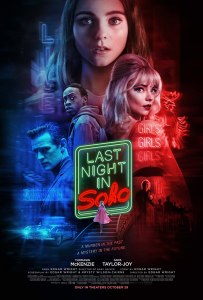 Last Night In Soho
Last Night In Soho
Co-Wri/Dir: Edgar Wright (Scott Pilgrim vs the World)
Eloise (Thomasin McKenzie) is an idealistic young student at a fashion college in North London. Though raised in remote Cornwall, she already sews her own dresses and wants to follow in her grandmother and mom’s footsteps as a designer. She’s also obsessed by the early 1960s — the fashions, the people and the music — and she constantly listens to her grandma’s old discs on a portable record player. But she can’t stand the condescending attitude of her roommate Jocasta and most of the other students. So she rents an attic bed-sit flat in Soho, and gets a job at a local pub to pay for it. But everything changes on her first night in her new home. She awakens to  find herself in Soho, circa 1964!, experiencing life through the eyes of young woman named Sandie (Anya Taylor-Joy: Queen’s Gambit)! Where Ellie is shy with mousy brown hair, Sandie is blonde, brash and self-confident. She marches into the Cafe de Paris and declares she’ll be the next singer on that famous stage. When Ellie wakes up in the morning, things are back to normal, but she feels. different. She starts sewing a 60’s style dress based on what she wore the night before in Soho. And she starts mimicking Sandie’s look and lifestyle — dying her hair, wearing makeup and sticking up for herself. But gradually she realizes 60s Soho wasn’t the fun place she imagined — it was actually full of exploitation, violence and organized
find herself in Soho, circa 1964!, experiencing life through the eyes of young woman named Sandie (Anya Taylor-Joy: Queen’s Gambit)! Where Ellie is shy with mousy brown hair, Sandie is blonde, brash and self-confident. She marches into the Cafe de Paris and declares she’ll be the next singer on that famous stage. When Ellie wakes up in the morning, things are back to normal, but she feels. different. She starts sewing a 60’s style dress based on what she wore the night before in Soho. And she starts mimicking Sandie’s look and lifestyle — dying her hair, wearing makeup and sticking up for herself. But gradually she realizes 60s Soho wasn’t the fun place she imagined — it was actually full of exploitation, violence and organized  crime. And the separation between the two worlds starts to blur… with the ghosts of Sandie’s far-off dangers appearing in her real life in modern London. Is Eloise losing her mind? And can she ever escape from this dual existence?
crime. And the separation between the two worlds starts to blur… with the ghosts of Sandie’s far-off dangers appearing in her real life in modern London. Is Eloise losing her mind? And can she ever escape from this dual existence?
Last Night in Soho is a cool, fun and sometimes scary coming-of-age story loosely wrapped in a time-travel theme. Throw in life in London, 60s girl groups, fashion, Soho burlesque and seedy organized crime, and you have a fascinating and unique world to explore. Thomasin McKenzie (Leave No Trace) gives a terrific performance as a young woman trying to hang on to her sanity, while Anya Taylor-Joy (you might recognize her from the TV series The Queen’s Gambit) is a dynamo as her alter ego. Throw in some real ’60s stars — Terrence Stamp as a sleazy barfly, and an almost unrecognizable Diana Rigg as a curmudgeonly landlady — and you’re left with a lot to watch.
Great movie.
 Antlers
Antlers
Co-WriDir: Scott Cooper (Hostiles)
Julia (Keri Russell) is a school teacher in a mining town in the Pacific northwest. She lives with her brother Paul (Jesse Plemons), the local sheriff. She fled to California 20 years earlier to escape her abusive father. But now that he’s dead, she feels safe to move back again. Little does she know there are other dangers in this small town. In any case, she’s having trouble fitting in. None of the 12 year olds in her class participate, or even seem interested, in what she’s teaching. And one kid in particular, Lucas (Jeremy T Thomas) looks malnourished, bullied and fearful. And he draws terrifying pictures at his desk. She reaches out to help him, but though needy, he rejects her. You see, his dad ran a meth lab in an abandoned mine where something terrible happened.
Now his dad and his seven-year-old brother are ill with a strange disease — the can only eat raw flesh. Lucas keeps them locked up in the attic,  bringing them small animals he traps and any roadkill he can find. But it’s not enough. So here we have a do-gooder teacher who wants to save what she sees as an abused and neglected child, while he’s trying desperately to keep his family alive. But when Lucas’s dad tries some human flesh, he really starts to change, both physically and mentally. Can a little boy keep a monster at bay? Or will it take a schoolteacher to stop this cannibal killer?
bringing them small animals he traps and any roadkill he can find. But it’s not enough. So here we have a do-gooder teacher who wants to save what she sees as an abused and neglected child, while he’s trying desperately to keep his family alive. But when Lucas’s dad tries some human flesh, he really starts to change, both physically and mentally. Can a little boy keep a monster at bay? Or will it take a schoolteacher to stop this cannibal killer?
Antlers is a bloody and gory — though not all that scary — horror movie  set among the gorgeous lakes and mountains of Western Canada. Strangely, the monster in the story — modelled on the Windigo, a rapacious half-human, half-animal creature — is part of the Anishinaabe culture in the east, not the Pacific Northwest. And aside from Graham Greene (as a walk-on indigenous explainer), everyone else is white. That said, I like the acting, and the fact the characters are not all strictly good or bad, more nuanced than in your typical scary movie. Antlers is a chilling — though slow-paced — horror-thriller with enough blood and guts to keep you satisfied on Hallowe’en.
set among the gorgeous lakes and mountains of Western Canada. Strangely, the monster in the story — modelled on the Windigo, a rapacious half-human, half-animal creature — is part of the Anishinaabe culture in the east, not the Pacific Northwest. And aside from Graham Greene (as a walk-on indigenous explainer), everyone else is white. That said, I like the acting, and the fact the characters are not all strictly good or bad, more nuanced than in your typical scary movie. Antlers is a chilling — though slow-paced — horror-thriller with enough blood and guts to keep you satisfied on Hallowe’en.
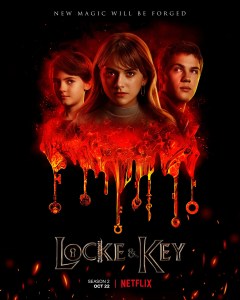 Locke & Key
Locke & Key
Developed by Meredith Averill, Aron Eli Coleite and Carlton Cuse, based on the graphic novel by Joe Hill and Gabriel Rodriguez
It’s the present day in small-town Mathesen, Massachusetts. The Locke family — eldest son Tyler (Connor Jessup: Blackbird, Closet Monster ), Middle sister Kinsey (Emilia Jones) and the youngest Bode (Jackson Robert Scott) — and their mom (Darby Stanchfield) have just relocated from Seattle. Their dad died in a terrible incident so maybe a new environment will help them get over it. They move into the stately family home, a huge, but crumbling, mansion known as the Key House. It’s been in the family for generations. While the Lockes know next-to-nothing about their history, everyone in this town knows exactly who they are. The two eldest enroll in the local prep school — Tyler joins the hockey team while Kinsey falls in with a crowd of  amateur filmmakers — while Bode is left to explore the mansion. And what he discovers is magical — a series of keys, each with its own properties. One lets you walk through a door and emerge wherever you want to be. Another lets you enter someones mind and explore their memories. Soon Tyler and Kinsey join in, but their mother and their uncle Duncan (Aaron Ashmore) can’t comprehend anything magical, even when they experience it themselves. Only kids can remember it. But all is not just fun and games, There’s an evil shape-shifting demon, a beautiful woman known as
amateur filmmakers — while Bode is left to explore the mansion. And what he discovers is magical — a series of keys, each with its own properties. One lets you walk through a door and emerge wherever you want to be. Another lets you enter someones mind and explore their memories. Soon Tyler and Kinsey join in, but their mother and their uncle Duncan (Aaron Ashmore) can’t comprehend anything magical, even when they experience it themselves. Only kids can remember it. But all is not just fun and games, There’s an evil shape-shifting demon, a beautiful woman known as  Dodge, who covets these keys for her own nefarious purposes. Who will triumph in the end?
Dodge, who covets these keys for her own nefarious purposes. Who will triumph in the end?
Locke & Key is a wonderful TV series that’s part adventure, part horror, part psychological thriller and part family drama. I’m purposely revealing very little because I don’t spoil the plot, but it’s well acted — with a mainly Canadian cast — and lots of unexpected plot turns and cool special effects. And the series was shot right here, just outside CIUT’s broadcast studios in the gothic hallways of Hart House (pre-Covid, of course.) So if you’re looking for something Hallowe’en-y to binge on, you have to check out Locke & Key.
Locke & Key seasons 1 and 2 are streaming now on Netflix; Antlers and Last Night in Soho both open this weekend; check your local listings.
This is Daniel Garber at the Movies, each Saturday morning, on CIUT 89.5 FM and on my website, culturalmining.com.
Opening and closing nights at TIFF. Films reviewed: Dear Evan Hansen, One Second
Hi, this is Daniel Garber at the Movies for culturalmining.com and CIUT 89.5 FM.
The ending of summer and TIFF marks the beginning of Toronto’s Fall Film Festival season. And first in line is the TPFF, Toronto’s Palestine Film Fest on now through Sunday, with films, workshops, exhibitions and feasts, both here and digitally across the country. Go to TPFF.ca for details.
But this week I’m tying up loose ends by looking at the opening and closing night features at TIFF. In a show of solidarity and togetherness in the face of increasing worldwide tension, the festival opened with a film from the US and closed with one from China. And, coincidentally, both films are about underdogs and outcasts. There’s a suburban high school student whose life is changed by a letter, and an escapee from a labour camp in China whose life is changed by a movie.
Dir: Stephen Chbosky
Evan Hansen (Ben Platt) is a high school student in suburban USA. He’s depressed, painfully shy and insecure. His broken arm is in a cast. He lives with his mom, a nurse (Julianne Moore) who sends him to a therapist to handle his difficulties. His summer assignment? To write optimistic letters to himself in the third person — “Dear Evan Hansen” to help raise his spirits. And his Mom suggests he get all his friends to sign his cast. But the first day of school turns out so dismal that he rewrites his letter into one of despair. An angry loner named Connor (Colton Ryan) offers veto sign his cast — so we can both pretend we have friend. But after a tussle, Connor snatches the letter from his hands and runs away. And the next day Connor is dead from suicide, with no note except Evan’s sad letter they find in his pocket. Connor’s Mom and Dad (Amy Adams, Danny Pino)
turn to Evan — thinking they’ve found their late son’s secret pal. Evan, who barely sees his mother is so 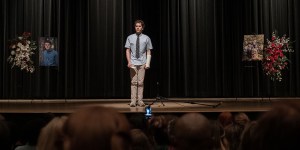 happy to have anyone pay attention to him, that he decides to brighten their day by talking about Connor and himself — all imaginary of course but anything to make them happier. And it doesn’t hurt that Evan has a crush on Connor’s sister, Zoe (Kaitlyn Dever).
happy to have anyone pay attention to him, that he decides to brighten their day by talking about Connor and himself — all imaginary of course but anything to make them happier. And it doesn’t hurt that Evan has a crush on Connor’s sister, Zoe (Kaitlyn Dever).
Alana, the most popular kid at school (Amandla Stenberg) urges Evan to form a group to remember Connor. He can hardly say no since he says they were once friends. The deception grows and grows, until he gives a moving speech captured on other people’s phones, which immediately goes viral. Donations pour in to commemorate Connor, his family is happy again, and tens of thousands feel their lives have been improved, even saved, because of Evan’s talk. But it’s all a deception. Will he come clean? And will he get the help he needs/ And what about Zoe?
Dear Evan Hansen is an emotionally moving, constant tear-jerker that doesn’t let up until the end. It’s bases on the hit Broadway musical, and stars Ben Platt who originated the role and who sings with a sublime angelic tenor. It’s filled with songs and dances punctuated by wistful gazes at the sky, a tree, a window or into other people’s eyes. I’m not a big fan of Broadway musicals but I really liked this one. It’s poignant more than depressing, and you really feel for the main characters. So if you want to break your heart over and over, and listen to some songs, don’t miss Dear Evan Hansen.
Dir: Zhang Yimou
It’s China’s Cultural Revolution. A man (Zhang Yi) who escaped from a labour camp in the Gobi Desert is walking across the sand dunes. His mission: to watch a movie. There are very few movies you’re allowed to watch during the Cultural Revolution, and he’s desperate to see one in particular. But there’s someone else also looking for a film. A street urchin with dirty face and unkempt hair, known as Orphan Liu (Liu Haocun) is intent on stealing a reel for his own nefarious purposes (we find out later she’s a girl, not a boy). The two engage in a cat-and-mouse chase until the reel is returned to its rightful place: in the hands of the town projectionist known as “Mister Movie” (Wei Fan). He’s an arrogant perfectionist, highly revered in the village because he’s the only source of entertainment. 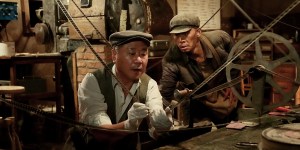 Tonight’s show? Heroic Sons and Daughters, an operatic drama about the anti-Japanese War decades earlier. But when the dust settles Mister Movie realizes one of the reels has been damaged — it’s just a pile of tangled film covered with sand and dust. He cancels the screening. Whaaaat?
Tonight’s show? Heroic Sons and Daughters, an operatic drama about the anti-Japanese War decades earlier. But when the dust settles Mister Movie realizes one of the reels has been damaged — it’s just a pile of tangled film covered with sand and dust. He cancels the screening. Whaaaat?
The townspeople are mortified, and none more that the escaped prisoner. He, and everyone else, agree to communally rescue the damaged reel, wiping clean each frame and rolling it back into its spool. The escapee especially needs to view it that night. Why? Because of the newsreel. His daughter — whom he hasn’t heard from since he was arrested and sent away for punching a Red Guard — appears in it for one second. It’s his only chance to see her. And he’ll stop at nothing so he can see it. Will the films be shown? Will he get to see his daughter? And will Orphan Liu get what she’s looking for?
 One Second is a lovely and touching look at the personal effect of movies on the people who watch them. It’s well crafted and historically evocative. It’s set during the Cultural Revolution, with Mao’s quotations painted on every wall. Though it’s portrayed lightly, it does reveal the poverty, oppression and unfairness of that period. People are hungry, children are bullied, police beat up the wrong person, and everyone — including Mister Movie —is in constant fear of losing their job due to corrupt or indifferent party members. But there are happy times too, like when the whole village bursts into song, along with the soldiers on the screen. No spoilers, but the storyline of the movie they watch — Heroic Sons and Daughters, about a soldier separated from his daughter — is reflected in the real lives of all the main characters in One Second.
One Second is a lovely and touching look at the personal effect of movies on the people who watch them. It’s well crafted and historically evocative. It’s set during the Cultural Revolution, with Mao’s quotations painted on every wall. Though it’s portrayed lightly, it does reveal the poverty, oppression and unfairness of that period. People are hungry, children are bullied, police beat up the wrong person, and everyone — including Mister Movie —is in constant fear of losing their job due to corrupt or indifferent party members. But there are happy times too, like when the whole village bursts into song, along with the soldiers on the screen. No spoilers, but the storyline of the movie they watch — Heroic Sons and Daughters, about a soldier separated from his daughter — is reflected in the real lives of all the main characters in One Second.
This is a beautiful, nostalgic, and ultimately feel-good movie.
Dear Evan Hansen opens this weekend — check your local listings; One Second should be opening later this year.
This is Daniel Garber at the Movies, each Saturday morning, on CIUT 89.5 FM and on my website, culturalmining.com
Potatoes, Radios and Poppies. Films reviewed: Potato Dreams of America, How to Fix Radios, Poppy Field #InsideOut!
Hi, this is Daniel Garber at the Movies for culturalmining.com and CIUT 89.5 FM.
Inside Out, Toronto’s LGBT film festival, kicked off last night, and is open for digital viewing across Ontario. It has movies, docs and shorts from around the world, many showing here for the first time.
This week I’m looking at three of these new movies two of which are directors’ first features. There’s a “little potato” in Russia, a broken radio in Canada, and a field of poppies in Romania.
Wri/Dir: Wes Hurley
Little Potato (Hersh Powers) is a school kid in 1980s Vladivostok, in the USSR a land of Perestroila and Glasnost. But he can’t stand communism, he puts all his faith in Jesus and wants to go to America, where it’s just like the movies and everyone has coloured TV. So he is overjoyed when his devoted and progressive mom, a prison doctor becomes a mail-order bride and takes him with her to Seattle. He likes his new school and stepdad, and is thrilled to see the relative openness toward gay people. But the teenaged potato (Tyler Bocock) wants to  assimilate and doesn’t American attitudes. And when his step father’s Christianity turns out to be steeped in homophobia he’s afraid they’ll both be on the next plane back to Russia. Will Potato’s dreams be ruined?
assimilate and doesn’t American attitudes. And when his step father’s Christianity turns out to be steeped in homophobia he’s afraid they’ll both be on the next plane back to Russia. Will Potato’s dreams be ruined?
Potato Dreams of America is a highly stylized, theatrical and campy version of the real memoirs of Russian American director Wes Hurley. And it’s full of surprises. I’m only allowed a capsule review here, but let me just say, if you like to watch a view of gay life in Russia and America, with lots of homoerotic details, occasional two-dimensional sets, and characters who burst into song, you’ll love this one.
Dir: Casper Leonard, Emily Russell
It’s summer in a rural town town in Ontario. Evan (James Rudden) has found a summer job — cleaning up the land around a ramshackle hut before acomes in and clears it all away. He’s a quiet loner, a high school student who lives with his dad in an isolated home ad dresses in basic clothes: Shorts, T-shirt and ball cap. So he’s taken aback when he meets his supervisor. Ross (Dimitri Watson) is his opposite: a combative angry attitude, dressed in overalls, with bright pink hair, black fingernail polish and a pierced septum. He’s here, he’s queer and he doesn’t care who knows it. Evan has never seen anyone like him, but they gradually become friends. They meet up with Ross’s sister to go on picnics, and retreats to an abandoned house by a lake that everyone uses. And there they share intimate secrets by the campfire.
But things are complicated.
Small towns have gay people but they also have bullies. Ross is 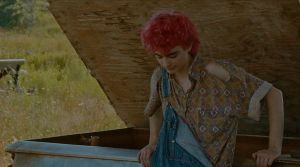 constantly tormented by a thug named Jake who rides around on his three wheeled RV, smoking pot and drinking beer with his chowderhead friends. Problem is, he’s also the son of their employer who owns the land they’re cleaning up and pays their salaries. Why don’t you move to the city, Evan wonders. Because, Ross says, he likes the quiet and trees there, and the nature all around him. And he doesn’t want a moron like Jake determining what he does with his life. But how much longer can Ross endure the punches and taunts from Jake?
constantly tormented by a thug named Jake who rides around on his three wheeled RV, smoking pot and drinking beer with his chowderhead friends. Problem is, he’s also the son of their employer who owns the land they’re cleaning up and pays their salaries. Why don’t you move to the city, Evan wonders. Because, Ross says, he likes the quiet and trees there, and the nature all around him. And he doesn’t want a moron like Jake determining what he does with his life. But how much longer can Ross endure the punches and taunts from Jake?
How to Fix Radios (the title refers to one of Evan’s skills) is a warm look at friendship and the life of a queer kid in small-town Ontario. It’s an ultra-low-budget, indie film shot last summer during COVID, with all the spacing and location rules that entailed, which may explain why the sound quality is dodgy (some lines are lost or else overpowered by background noise.) But the great music, beautiful images and engaging characters make it a treat to watch.
Dir: Eugen Jebeleanu
It’s present-day Romania. Cristi (Conrad Mericoffer) is a member of the Gendarmerie, an elite national police force run military style, using tightly-knit squads. They’re called in to handle dangerous riots and criminal acts. But tonight they’re at a movie theatre. How come? A lesbian drama, sponsored by an LGBT group, is scheduled to play that night. But the theatre has been occupied by a group of right-wing Christian activists. Draped in Romanian flags and carrying icons of the Virgin Mary, they say they’re trying to stop the pornographic “Homosexual Mafia”. The people in the audience say they just want to watch a movie. The tension is rising, but for some reason, Christi, unlike the other gendarmes, is standing far back, doing nothing. What is bothering him? But when he is confronted by a gay man, he loses it and beats the man up. This outs his whole squad in potential trouble. Why did he do it? Christi is gay too, but doesn’t want the other cops to know. He even has a Parisian lover waiting to meet him tonight in his apartment. Has Christi’s secret been revealed? Will he lose his job? And can he face his inner demons?
Poppy Field (and I have to admit, I have no idea what the title  means) is a realistic and tense drama about a gay Romanian cop being pushed to the brink by his two separate lives: a passionate personal life and a rigid and violent workplace. The film is divided in the same way: part one is a night with him and his lover Hadi, and part two is a day at work. This is an excellent movie — a first feature but done in the style of current Romanian cinema: hyper realistic, done in real time, dealing with social issues. If you’ve ever seen contemporary Romanian movies like Police: Adjective, you’ll immediately recognize the style. Director Jebeleanu uses the fantastic veteran cinematographer Marius Panduru gives it his distinctive, minimalist look. Mericoffer, as Christi, rarely speaks, but you can see the angst brewing beneath his stone-cold features.
means) is a realistic and tense drama about a gay Romanian cop being pushed to the brink by his two separate lives: a passionate personal life and a rigid and violent workplace. The film is divided in the same way: part one is a night with him and his lover Hadi, and part two is a day at work. This is an excellent movie — a first feature but done in the style of current Romanian cinema: hyper realistic, done in real time, dealing with social issues. If you’ve ever seen contemporary Romanian movies like Police: Adjective, you’ll immediately recognize the style. Director Jebeleanu uses the fantastic veteran cinematographer Marius Panduru gives it his distinctive, minimalist look. Mericoffer, as Christi, rarely speaks, but you can see the angst brewing beneath his stone-cold features.
Short, sharp and fast-moving, Poppy Field is a great art house pic.
Potato Dreams of America, How to Fix Radios, and Poppy Field are all playing now at Inside Out, Toronto’s LGBT Film Festival.
This is Daniel Garber at the Movies, each Friday morning, on CIUT 89.5 FM and on my website, culturalmining.com
Art and deception. Films reviewed: Propaganda: The Art of Selling Lies, The Art of Self Defense, Push
Hi, this is Daniel Garber at the Movies for culturalmining.com and CIUT 89.5 FM.
The things you see online – or on TV for that matter – aren’t always true (suprised?). This week I’m looking at three movies, two docs and one dark comedy, about lies and deceptions. There’s a man who trains in the art of karate, a look at the art of selling lies, and a look at the lies of selling real estate.
 Propaganda: The Art of Selling Lies
Propaganda: The Art of Selling Lies
Dir: Larry Weinstein
What is Propaganda? Is it art and literature? Or brainwashing and fake news? The word comes from a benign Catholic term meaning the propagation of faith, the planting the seeds. The Vatican opened a department of propaganda to counter Martin Luther’s austere reforms. It combined the opulance of baroque cathedrals, the  lure of incense and all the lush frescos, paintings and marble statues you’ve seen. But art and magic and religion were around long before that, and so, says this documentary, was propaganda. Some historians
lure of incense and all the lush frescos, paintings and marble statues you’ve seen. But art and magic and religion were around long before that, and so, says this documentary, was propaganda. Some historians  trace it as far back as Neandrathal cave paintings.
trace it as far back as Neandrathal cave paintings.
Propaganda is easy to spot in other cultures but very hard to see in your own. Many people were entanced by dictators like Hitler and Stalin thanks to their skillful use of films (like Leni Riefenstahl’s Triumph of the Will) radio broadcasts and posters. But with the shift to digital culture, it has taken on new forms; like patently false news stories online, repeated ad infinitum, until people start to believe it.
Propaganda: The Art of Selling Lies is a fun, light documentary that talks to a lot of artists and writers – Astra Taylor, Ai Weiwei and Kent Monkman – but also musicians, analysts and others. It shoots a constant barrage of propaganda at you, images from the past 100 years, shown in harsh black and white periodically blanketed in fields of red. A lot of it is familiar but there are also some bizarre juxtapositions you’ve never heard of: like the racing cars that now drive around the former Nazi Nuremberg Stadium. Or Laibach, a Slovenian band known for its fascistic costumes and images, who performed in North Korea before a concert hall of nonplussed party apparatchiks and university students. Very funny.
Wri/Dir: Riley Stearns
It’s the 1990s in small-town America. Casey (Jesse Eisenberg) is a shy accountant who lives with his dachshund. He’s a 98-pound weakling who works in an office full of alpha males. But when he’s violently attacked by strangers on motorbikes he decides  something has got to change. No more sand will be kicked in his face! He joins a local karate dojo with its own set of hierarchical rules. Everyone is ranked by their belt colour. There’s Anna (Imogen Poots) who teaches the kids class; get on her wrong side and she’ll beat you to a pulp. And at the top of
something has got to change. No more sand will be kicked in his face! He joins a local karate dojo with its own set of hierarchical rules. Everyone is ranked by their belt colour. There’s Anna (Imogen Poots) who teaches the kids class; get on her wrong side and she’ll beat you to a pulp. And at the top of 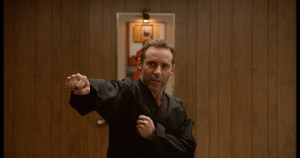 the heap is Sensei (Alessandro Nivola).
the heap is Sensei (Alessandro Nivola).
He says karate is not just a martial art, it’s a way of life. You must punch with your feet and kick with your hands. Casey is starry-eyed, and ready to do whatever Sensei tells him. You must become more masculine, he says. Stop learning French, start learning German. And throw out those adult contemporary CDs; only listen to metal! Casey takes the blue pill. He leaves his job and devotes his life to karate. He worships Sensei, has a secret crush on Anna, and proudly displays his 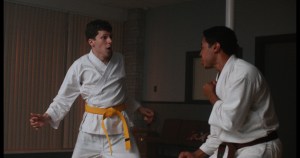 low-ranked yellow belt for all to see.
low-ranked yellow belt for all to see.
But something is not right. When he joins the mysterious night classes he is exposed to a violent world of hyper-masculinity he doesn’t subscribe to. He is asked to perform dubious tasks outside of the dojo. Is this place only about karate? Or is it a cult? And what is hidden behind Sensei’s secret door?
The Art of Self Defense is a low-budget, uncategorizable, odd sort of a movie, part dark comedy, part mystery, with a bit of violence and horror mixed in. It’s slow to develop, but picks up nicely about halfway through. It’s filled with wood paneling, old computers and ugly clothes from the 90s, which adds a humorous tinge. But It’s hard to tell whether it’s being satirical or straightforward, comic or scary. Jesse Eisenberg is totally believable as the wimpy accountant trying to become more manly, and Allessandro Nivola is good as the mysterious sensei.
Take it as a cautionary tale about the search for masculinity, self-confidence and the cult of martial arts and you’ll enjoy this dark comedy.
Dir: Fredrik Gertten
There’s a housing crisis in the world’s cities and no one knows seems to know what’s going on. In Toronto there’s a shortage of affordable apartments, with stagnant wages, soaring rents and home prices quadrupling. Speculators are buying up land as a bankable commodity, something bought and sold, with little  thought given to the people who live there. And in many cities entire blocks of housing sit empty, because rent income is dwarfed by what they can earn from the constant increase in value of the buildings themselves. What’s going on?
thought given to the people who live there. And in many cities entire blocks of housing sit empty, because rent income is dwarfed by what they can earn from the constant increase in value of the buildings themselves. What’s going on?
Enter Leilani Farha, the United Nations Special Rapporteur on  Adequate Housing. She’s a mom from Ottawa who travels around the world collecting data and advocating on behalf of tenants everywhere. She views housing not as an investment but as a right.
Adequate Housing. She’s a mom from Ottawa who travels around the world collecting data and advocating on behalf of tenants everywhere. She views housing not as an investment but as a right.
This documentary looks at the dire situation in the world’s cities – from Milan to Berlin, Seoul to Valpariaso – where  people are facing the same situations: gentrification, renoviction, and the displacing of average- and low-income earners from the world’s cities.
people are facing the same situations: gentrification, renoviction, and the displacing of average- and low-income earners from the world’s cities.
It explores the role of organized crime in the housing crisis.  They use property investment as a way of laundering money by over investing in legit properties, driving up demand and prices and hiding their illicit profits.
They use property investment as a way of laundering money by over investing in legit properties, driving up demand and prices and hiding their illicit profits.
It looks at how the financial sector is turning housing into an investment commodity, with the people who live in them entirely erased from the equation. One particularly notorious player is Blackstone – founded by former Lehman Brothers execs – a voracious American property investment company that swooped into the real estate market after the stockmarket crash of 2008. Now they’re making money by 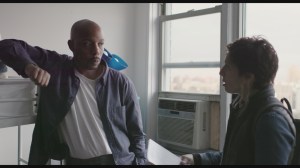 buying up public housing for profit, while neglecting the people they were actually built for.
buying up public housing for profit, while neglecting the people they were actually built for.
And it looks at the role of pensions, both government and private, which invest in housing to grow their capital, but, unintentionally, lead to skyrocketing prices and increasing homelessness.
Push is an incredibly important and informative documentary that explains in simple terms the economics, politics and effects of this crisis. It uses experts – like Joseph Stiglitz, Saskia Sassen and Roberto Saviano – to explain the reasons behind the crisis. But it also talks with ordinary people around the world. It shows the multiple, small-scale problems people face as well as the large-scale disasters, like the Grenfell Tower Fire in London. They are all related. And it’s the great Leilani Farha who is trying to confront these problems in a new way.
I recommend this doc.
Propaganda: The Art of Lies, Push, and The Art of Self Defense all open today in Toronto; check your local listings.
This is Daniel Garber at the Movies, each Friday morning, on CIUT 89.5 FM and on my website, culturalmining.com.
NAFTA movies? Films reviewed: Giant Little Ones, Sólo con Tu Pareja PLUS Sui Generis: An Alternative History of Mexican Cinema
Hi, this is Daniel Garber at the Movies for culturalmining.com and CIUT 89.5 FM.
If you’ve been watching movies over the past few years, you may have noticed a big change. Some of the biggest Oscars are going to directors like Guillermo Del Toro, Alfonso Cuaron and Alejandro Gonzales Iñaritu.
 When did Mexico start making movies? The answer is: Mexico has been making great movies for a very long time… we just never knew about it. But there is one way to fill in that gap in our collective memories.
When did Mexico start making movies? The answer is: Mexico has been making great movies for a very long time… we just never knew about it. But there is one way to fill in that gap in our collective memories.
“Sui Generis“ refers to unique species or bodies of work. Sui Generis: An  Alternative History of Mexican Cinema is a suprising series of films at TIFF Cinematheque. It’s programmed by Diana Sanchez and Guillermo del Toro and includes some really famous movies – like Buñuel’s Avenging Angel – and an equal number I’ve never heard of. Surprises include anti-church satires, political
Alternative History of Mexican Cinema is a suprising series of films at TIFF Cinematheque. It’s programmed by Diana Sanchez and Guillermo del Toro and includes some really famous movies – like Buñuel’s Avenging Angel – and an equal number I’ve never heard of. Surprises include anti-church satires, political  protests, bizarre fantasies and fantastical films that transcend the genres we know. There’s also a sexual frankness largely missing in Hollywood movies under the Hays Code (1930-1968), but legal in Mexico.
protests, bizarre fantasies and fantastical films that transcend the genres we know. There’s also a sexual frankness largely missing in Hollywood movies under the Hays Code (1930-1968), but legal in Mexico.
Aside from Buñuel’s films and a few others, I had never heard of most of these movies, but Mexican cinephiles weep over the importance and uniqueness of these selections; a staple on late-night Mexican TV but rarely seen on the big screen. This series features directors like Ripstein, Buñuel, Cuaron, del Toro and many others, from the 1930s up to recent times.
It’s quirky, eclectic and grand. I recommend this series.
This week I’m looking at movies from Canada and Mexico. There’s a Mexican sex farce about a man who bites off more than he can chew; and a Canadian coming-of-age drama about a boy forced to choke back his tears.
Wri/Dir: Keith Behrman
It’s a middle class suburb somewhere in North America Franky (Josh Wiggins) is about to turn 17 at a big party. All his teammates from the swim team will be there, his divorced mom (Maria Bello) will be away that night, lots of alcohol and music, and his beautiful but vapid girlfriend says she’s ready  to spend the night with him. And his best friend Ballas (Darren Mann) will be there to cheer him on. They’ve been inseparable since childhood and the two are popular and respected at school. This will be a life changing night for Franky… but not in the way he expects it.
to spend the night with him. And his best friend Ballas (Darren Mann) will be there to cheer him on. They’ve been inseparable since childhood and the two are popular and respected at school. This will be a life changing night for Franky… but not in the way he expects it.
The party ends early when his mom comes home, and his girlfriend decides not to stay. So the two drunk best friends end up crashing in  Franky’s bed, and something happens in the dark. Ballis rushes home, and the next day everything’s different. Rumours about Franky start spreading, he’s blanked in the hallways and ghosted on instagram. People say he’s gay and did something to Ballas, who does nothing to defend his former best friend.
Franky’s bed, and something happens in the dark. Ballis rushes home, and the next day everything’s different. Rumours about Franky start spreading, he’s blanked in the hallways and ghosted on instagram. People say he’s gay and did something to Ballas, who does nothing to defend his former best friend.
Only a few people stick by him. Mouse (Niamh Wilson) his out lesbian lab partner who packs a fake appendage in her jeans teaches him how to live with bullying (but I’m not gay! says Franky. Doesn’t matter says Mouse); and Natasha, Ballas’s sister (Taylor Hickson). She was once  popular too, until she was “slut shamed” after something terrible happened to her. They turn to each other, first as pariahs and friends, but it gradually turns into something more.
popular too, until she was “slut shamed” after something terrible happened to her. They turn to each other, first as pariahs and friends, but it gradually turns into something more.
Adding to the complications is Franky’s divorced gay Dad (Kyle MacLachlan). Franky hasn’t spoken to him since he moved away to live 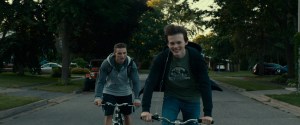 with his lover. He’s ready to offer advice but first Franky has to conquer his own homophobia. What really happened that night with Ballas? Will they ever be friends again? Is he in love with Natasha, or is it something else? And will things ever get better at school?
with his lover. He’s ready to offer advice but first Franky has to conquer his own homophobia. What really happened that night with Ballas? Will they ever be friends again? Is he in love with Natasha, or is it something else? And will things ever get better at school?
Giant Little Ones is an excellent coming-of-age drama, well acted, and based on an elegantly symmetrical script. It’s tender, funny and surprising, without leaving you depressed. I’ve seen this Canadian movie twice now, and it was just as moving the second time through.
 Sólo con tu pareja (1991) (a.k.a. Love in the Time of Hysteria)
Sólo con tu pareja (1991) (a.k.a. Love in the Time of Hysteria)
Wri/Dir: Alfonso Cuarón
Tomás Tomás (Daniel Giménez Cacho) is known for his sexual prowess and enormous ego. He sleeps with a different beautiful woman every night. He’s also fond of challenges and pranks like running naked down the stairwell to the lobby each morning to pick up the morning paper before anyone sees him. He’s handsome and fit, with a  successful career as an advertising creative and lives in a swank apartment building in a good Mexico city neighbourhood. He lives two doors away from Dr Mateo
successful career as an advertising creative and lives in a swank apartment building in a good Mexico city neighbourhood. He lives two doors away from Dr Mateo  Mateos (Luis de Icaza) and his wife, both good friends, who give him the keys to their apartment while they are away for the weekend.
Mateos (Luis de Icaza) and his wife, both good friends, who give him the keys to their apartment while they are away for the weekend.
But Tomas’s limits are challenged one night when he is faced with more than even he can handle. Mateo’s statuesque nurse Sylvia (Dobrina Cristeva) is arriving for a date, while his boss Gloria is also dropping by
to hear his advertising pitch for a brand of canned Jalapeños (and maybe a bit of spicy fun). Soon enough he’s bedding his boss in Mateo’s flat, Sylvia in his own, and is forced to inch his way naked back and forth between the bedroom windows and satisfy both women without letting either one know about  the other. To make matters worse, he finds himself infatuated by a new tenant in the flat between
the other. To make matters worse, he finds himself infatuated by a new tenant in the flat between
the two rooms. Clarisa is a flight attendant (Claudia Ramírez) and when he sees her robotic miming of seat belts and oxygen masks he sees through her window heid smitten. But can one man keep three women satisfied at one time? Alas, no.
He is fired from his job, and the vengeful nurse falsifies his medical tests telling him he is HIV positive, plunging him into a deep depression. Will Tomas discover the truth and change his ways? Or will he succumb to despair and throw himself off the tallest tower in Mexico City?
Sólo con Tu Pareja is a seldom seen, silly screwball comedy from the early 90s. It’s also Cuaron’s first feature film, long before his big hits like Gravity,  Roma and Y Tu Mama Tambien. This is no masterpiece, but it is a fun and interesting look at a totally different era. It reminds me of the 1960s comedy Boeing, Boeing, starring Jerry Lewis and Tony Curtis, also about a promiscuous man who juggles three flight attendant gilfriends in one Paris apartment. This one is also dated, but better than Boeing Boeing — the women in this movie have personalities, and Daniel Giménez Cacho is on fire as Tomas. And it adds a pair of Japanese businessmen, some mariachi musicians and a Montezuma lookalike to give it a more Mexican feel.
Roma and Y Tu Mama Tambien. This is no masterpiece, but it is a fun and interesting look at a totally different era. It reminds me of the 1960s comedy Boeing, Boeing, starring Jerry Lewis and Tony Curtis, also about a promiscuous man who juggles three flight attendant gilfriends in one Paris apartment. This one is also dated, but better than Boeing Boeing — the women in this movie have personalities, and Daniel Giménez Cacho is on fire as Tomas. And it adds a pair of Japanese businessmen, some mariachi musicians and a Montezuma lookalike to give it a more Mexican feel.
Giant Little Ones opens today in Toronto; check your local listings; and you can see Sólo con Tu Pareja just tonight at the Tiff Bell Lightbox as part of the fantastic TIFF Cinematheque Mexican film series called Sui Generis: An Alternative History of Mexican Cinema, on now.
This is Daniel Garber at the Movies, each Friday morning, on CIUT 89.5 FM and on my website, culturalmining.com.
Daniel Garber talks with Daniela Vega about A Fantastic Woman
(The second track is unedited, for Spanish speakers)
 Hi, this is Daniel Garber at the Movies for culturalmining.com and CIUT 89.5 FM.
Hi, this is Daniel Garber at the Movies for culturalmining.com and CIUT 89.5 FM.
Photos by Jeff Harris.
Marina Vidal is a happy woman. Her career as a singer is taking off, and her relationship with her lover, Orlando, is at a new stage. They are living together. He gives her a perfect birthday: dinner, dancing,  and a trip to a resort. But her luck takes a turn for the worse when he wakes up feeling strange. She rushes him to hospital but it’s too late. He’s dead. And suddenly everything changes.
and a trip to a resort. But her luck takes a turn for the worse when he wakes up feeling strange. She rushes him to hospital but it’s too late. He’s dead. And suddenly everything changes.
The authorities, police, doctor, and Orlandos family swoop down upon her. She is called a thief, a prostitute, a murderer. She is attacked emotionally and physically and told to stay away. All of this  because she’s a trans woman. They say her relationship with Orlando was not “normal”.
because she’s a trans woman. They say her relationship with Orlando was not “normal”.
But why should a woman settle for normal when she can be fantastic?
A Fantastic Woman is the name of a new film directed by Sebastián Lelio and starring Daniela Vega. Vega is a popular Chilean singer and actor who plays Marina in a remarkably powerful performance.
I spoke with Daniela on location at TIFF17 in September.
A Fantastic Woman has been nominated for an Academy Award: Best Foreign Language Film. It opens today in Toronto.
Cultural Revolution Nostalgia? Film reviewed: Youth
Hi, this is Daniel Garber at the Movies for culturalmining.com and CIUT 89.5 FM.
We’re in the midst of a cold wave, and it’s so cold, I feel like extending my New Year’s holiday by a few more days. So I’m keeping my review very short. This week, I’m looking at an historical drama from the Peoples Republic of China.
Dir: Feng Xiaogang
It’s the early 1970s in China, in the midst of the Cultural Revolution. In the 1960s, fanatical members of the Red Guard tried to purge the entire country of “bourgeois elements”. There’s widespread upheaval. Millions of educated youth, the zhishi qingnian, have been sent down to the countryside to work on farms. And because it’s a Cultural Revolution, only a handful of operas and ballets are allowed to be performed anywhere in China.
Enter He Xiaoping (Miao Miao) a young woman with pigtails from a poor family. She has been chosen to join an illustrious art troupe that performs these productions as part of the PLA, the Chinese Army. She is escorted from the train station by the always helpful Liu Feng, right into the middle of a rehearsal, with rows of leggy women in extra-short gym shorts and clingy tops are running about the hall in perfect formation. He Xiaoping is in awe, but also self-conscious and intimidated. She’s naïve, unsophisticated, and unskilled… the exact opposite of two beautiful  young women who are leading the group: Dingding (Yang Caiyu) and Suizi (Elaine Zhong). They are both relatively rich, come from big cities and look down on her simple ways. They say she sweats like a farm girl. But the director thinks He Xiaoping has natural talent. She tries to fit in but is constantly mocked and bullied. Will she ever succeed as a performer?
young women who are leading the group: Dingding (Yang Caiyu) and Suizi (Elaine Zhong). They are both relatively rich, come from big cities and look down on her simple ways. They say she sweats like a farm girl. But the director thinks He Xiaoping has natural talent. She tries to fit in but is constantly mocked and bullied. Will she ever succeed as a performer?
Liu Feng (Huang Xuan) is a kind and generous young man, modest, hardworking and always ready to help other people. So much so that they start to call him Lei Feng, not Liu Feng. Lei Feng was an ordinary soldier who died in the early 60s, but whose name and face is known to almost everyone in China. He’s on posters everywhere, and he’s a role model for everyone to follow. Liu Feng is seen as the living version of Lei Feng… but will his wholesome image stop him from showing his attraction to one of the women? At the end of the cultural revolution the group disbands and the members go their separate ways, becoming soldiers, journalists, and medics.
 The story picks up later, during the time of the Sino-Vietnamese war, where some of them meet again, and again much later in a more modern China. Who ends up doing well, and who is left behind? And has anyone changed their ways?
The story picks up later, during the time of the Sino-Vietnamese war, where some of them meet again, and again much later in a more modern China. Who ends up doing well, and who is left behind? And has anyone changed their ways?
Youth is an unusual look back at the Cultural Revolution. It works as a broad, epic romantic drama. The director Feng Xiaogang does Big Hollywood-style movies really well, with action, love, and as much gratuitous near nudity – steamy shower scenes, etc – as the censors will allow. I just had problems with the history. He sees it as a happy, nostalgic time of simple thoughts and good people. Sort of a Cultural Revolution-Lite. There have been many other movies about Chinese performers in the Cultural Revolution (Jia Zhangke’s Platform, Zhang Yimou’s Coming Home) but this is the first one I’ve seen that paints it as a happier time. Then there’s the war – like any good war movie with lots of explosions, valour and “war is hell” feeling. But this is Vietnam, which China attacked to “punish” them. Why? Because they drove the genocidal Khmer Rouge out of power in Cambodia!
Even so, the director tempers the movie with a bitter-sweet ending that makes you think about present-day China in a new light.
Youth – in Chinese with English subtitles – is playing now in Toronto: check your local listings.
This is Daniel Garber at the Movies, each Friday morning, on CIUT 89.5 FM and on my website, culturalmining.com
Daniel Garber talks with filmmaker Pat Mills about Don’t Talk to Irene
 Hi, this is Daniel Garber at the Movies for culturalmining.com and CIUT 89.5 FM.
Hi, this is Daniel Garber at the Movies for culturalmining.com and CIUT 89.5 FM.
Irene is an unusual girl who lives in a small town an hour north of Toronto. It’s her first day of highschool and she can’t wait to join the cheerleading team. But her mother says she’s just not  cheerleader material. She’s chubby, plain, and has no friends; garbage is her comfort zone. And when she is bullied by a mean girl and sent to an old age home for community service, she worries she’ll never fit in. Luckily, she meets a lot of potential mentors: an ex-boxer, two elderly women, a non-binary classmate, a
cheerleader material. She’s chubby, plain, and has no friends; garbage is her comfort zone. And when she is bullied by a mean girl and sent to an old age home for community service, she worries she’ll never fit in. Luckily, she meets a lot of potential mentors: an ex-boxer, two elderly women, a non-binary classmate, a  mean-ass cook, and a poster of Geena Davis on her ceiling… that seems to communicate with her. But will any of them ever talk to Irene?
mean-ass cook, and a poster of Geena Davis on her ceiling… that seems to communicate with her. But will any of them ever talk to Irene?
Don’t Talk to Irene is the name of a new movie, a coming-of-age comedy that premiered at TIFF17 and is now playing in Toronto. It’s written and directed by Toronto filmmaker Pat Mills known for his very dark — and very funny — looks at society’s outcasts.
I spoke with Pat Mills in studio at CIUT 89.5 FM.

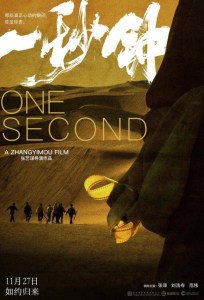
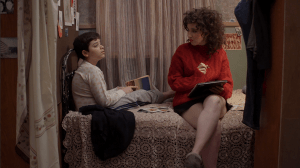
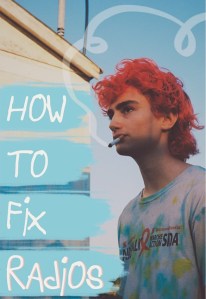
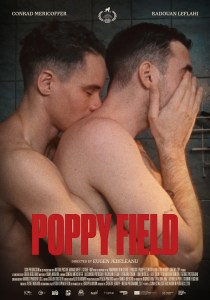
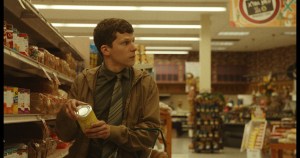
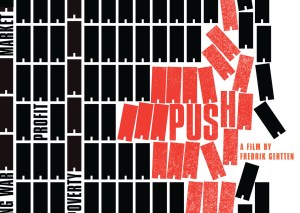
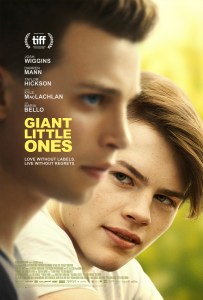


leave a comment